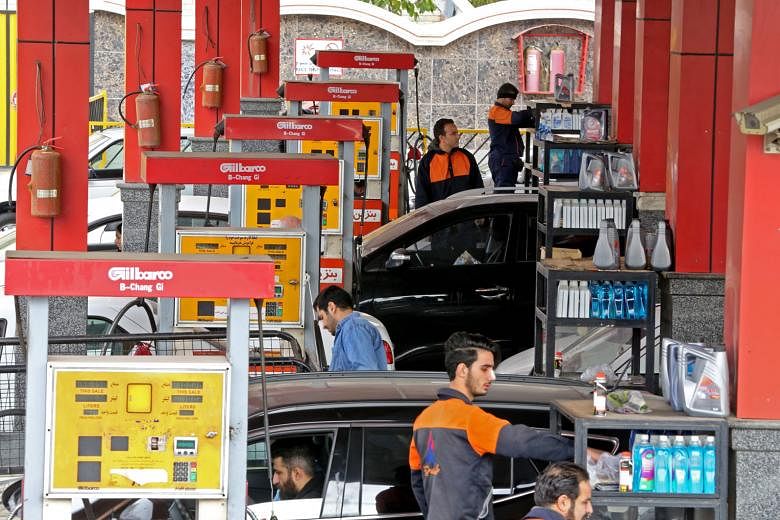WASHINGTON • The United States announced a new raft of sanctions on Iran yesterday and threatened further action to pressure its old adversary.
The move is part of a wider effort by President Donald Trump to curb Teheran's missile and nuclear programmes and diminish the Islamic Republic's influence in the Middle East. It follows Washington's withdrawal from a 2015 global agreement on Iran's nuclear programme.
In a statement, US Treasury Secretary Steven Mnuchin said: "Treasury's imposition of unprecedented financial pressure on Iran should make clear to the Iranian regime that they will face mounting financial isolation and economic stagnation until they fundamentally change their destabilising behaviour."
The sanctions target more than 700 entities, many for the first time. The list includes 50 Iranian banks, 200 individuals, and shipping vessels tied to Iran's shipping and energy sector, as well as the national airline, Iran Air, and more than 65 of its aircraft.
The action brings the total number of Iran-related targets to 900, the highest ever, according to the Treasury Department.
Mr Mnuchin said the pressure "is only going to mount from here" unless Iran's leaders halt their support for terrorism and abandon their nuclear ambitions "immediately".
However, the US has granted exemptions to eight economies, allowing them to temporarily continue buying Iranian oil, Secretary of State Mike Pompeo said.
-
700
More than this number of "individuals, entities, vessels and aircraft" will be sanctioned, according to the White House. They include Iranian banks, shipping companies and oil exporters.
20
More than this number of countries have already cut their oil imports from Iran, reducing purchases by over one million barrels per day.
Some of the eight economies - China, Greece, India, Italy, Japan, South Korea, Taiwan and Turkey - include top customers of Iran, an Opec member.
Mr Pompeo said that more than 20 countries have already cut their oil imports from Iran, reducing purchases by more than one million barrels per day.
"Our objective is to starve the Iranian regime of the funds it uses to fund violent activity throughout the Middle East and around the world. Our ultimate goal is to encourage them to abandon their revolutionary course," Mr Pompeo told reporters.
Mr Trump withdrew in May from the multi-nation deal that his predecessor Barack Obama had reached with Iran, calling it a failure because it addressed only the regime's nuclear programme.
Mr Pompeo reiterated demands for Iran to make a "180-degree turn" from its regional policies rooted in the 1979 Islamic Revolution, such as support for the Lebanese militia group Hizbollah.
"We hope a new agreement with Iran is possible, but until Iran makes changes in the 12 ways I listed in May, we will be relentless in exerting pressure on the regime," he said.
He said the eight economies exempted have "already demonstrated reduction of Iranian crude over the past six months and, indeed, two of those eight have already completely ended imports of Iranian crude".
"We continue negotiations to get all of the nations to zero," he added.
Mr Pompeo also said without specifying that the US would exempt three non-proliferation projects under way in Iran from the sanctions.
European powers have strongly disagreed with Mr Trump's decision, pointing out that Iran is abiding by the nuclear agreement, and have looked to create ways to allow their businesses to keep up commerce with the country.
Switzerland said it was holding talks with the US and Iran about launching a humanitarian payment channel to keep food and drugs flowing to Teheran.
US sanctions permit trade in humanitarian goods such as food and pharmaceuticals, but measures imposed on banks and trade restrictions could make such items more expensive.
Mr Trump has said the sanctions effort targets Iran's government, not its people, adding that more sanctions will come until Iran's government decides to "either abandon its destructive behaviour or continue down the path towards economic disaster".
REUTERS, BLOOMBERG, AGENCE FRANCE-PRESSE

